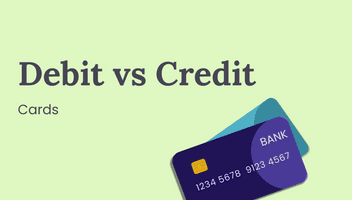Credit cards and debit cards allow us to do the thing we most love and hate to do – spend money. Even though they look the same, there is one key difference:
With a debit card you spend your own money – but with a credit card you are borrowing money from the bank.
Keeping that in mind, let’s run over some of the basics on Debit and Credit cards. Here’s what we’ll cover:
- How does your debit card work?
- How does your credit card work?
- Credit Card Debt
- Reasons why Credit Cards Are Still More Good Than Bad
How Does Your Debit Card Work?
Your debit card gives you access to your own money.
So if you had $650 in your account and you used your debit card for a $50 purchase, you would have $50 less. Your debit account is also where you will be drawing money from the ATM. So if you withdraw money from an ATM that will also come from the money you deposited at the bank.
Will I be Charged Interest?
Since you are using your own money, debit cards won’t cause you to owe any interest. However, most debit accounts will have some form of fees that will be charged to your account on a monthly basis.
What is Overdraft?
If you end up spending more than you have deposited, your account will go into overdraft. Depending on the agreement you have with your card issuer, you will have at least a $100 overdraft limit.
The overdraft is the amount of money you can spend after your account reaches $0. However, each transaction after $0 will lead to you incurring an overdraft fee.
How Does Your Credit Card Work?
Your credit card gives you access to a loan from your card issuer.
When you apply for a credit card, your issuer will give you a spending limit based on certain factors such as your monthly income and credit history.
What is a Billing Cycle?
Since a credit card is a loan, you will need to pay back at least some of the money you’ve spent over the month.
Your billing cycle is the amount of time that passes between statements.
A typical credit card will have a billing cycle of 28 – 31 days. Your statement will reflect the amount that you spent in that time and you will have until 21 days after your next statement in order to pay off your debt without incurring any interest.
What is Credit Card Debt?
Any money that you spend with a credit card is debt.
However, the debt only becomes a problem when you end up spending more than you can afford to pay off within the grace period.
Once the grace period passes, you will begin to incur interest on the amount that you owe. The absolute worst case scenario is owning multiple credit cards that are all overdue.
Are There Any Benefits to Having A Credit Card?
There are plenty of benefits to having a credit card! Let’s quickly run through a few of them so that you can see they aren’t all bad.
Flexibility
A credit card allows you to use your issuers money. This allows you some breathing room to either use your own cash for other reasons. This can be useful if something happens unexpectedly or you have to make a large purchase. In this case, the credit card will give you some extra time to recover from the purchase.
Credit History
Your credit score is a profile that describes your ability to pay back debt. When you consistently pay off credit card debt within your grace period, it will show that you can reliably honour debts of any kind. Therefore, having a credit card and paying it off responsibly will reflect positively on your credit score.
A good credit score indicates to an issuer that lending you money is a low risk investment. Therefore, you will be able to get larger loans, for instance a mortgage – with less hassle and at much lower interest rates.
Earn Rewards
Depending on the type of card you own, your card issuer will offer incentives for using your credit card based on partnerships they may have with other companies.
A common example is air miles rewards cards. With these cards every purchase that you make earns you points. Overtime, these points can be converted into flights at heavily reduced prices.
Conclusion
Like it or not, we all have to spend money from time to time. In this article we went over two ways to do so by using either your debit or credit card. In future articles we’ll talk more about how you use these cards to your benefit amongst other financial topics such as budgeting.

